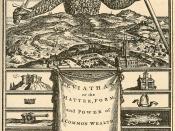When one examines the maxim of Thomas Hobbes as set forth in Leviathan it becomes obvious that Hobbes believes the nature of man to be bad. According to Hobbes, if we as men were left to exercise our own private judgement regarding our affairs we would most assuredly collapse into a state of war. He believes that when there is no singular, ever-present power to keep man in awe, and to control man by fear of punishment from that singular power, that man will break his agreements and act in his own self-interest. "For the Lawes of Nature (as Justice, Equity, Modesty, Mercy, and (in summe) doing to others, as wee would be done to,) of themselves, without the terrour of some Power, to cause them to be observed, are contrary to our natural passions, that carry us to Partiality, Pride, Revenge, and the like. And Covenants, without the Sword, are but Words, and of no strength to secure a man at all."
(Hobbes, pg.117) The laws that are enacted are contrary to our self-interest, so without the terror of some ever-present power to instill fear in all man, we would abstain from no measure in order to preserve our own well being. In a state of war man is in "a Continual fear and danger of a violent death; and the life of man (is) solitary, poor, nasty, brutish, and short." (Hobbes. Pg. 107) The only way to prevent entering a state of war is to erect one common power, which is known as a commonwealth or sovereign, who is "One person, of whose Acts a great Multitude, by mutuall Covenants one with another, have made themselves every one the Author, to the end he may use the strength and means of them all, as he shall think expedient,


